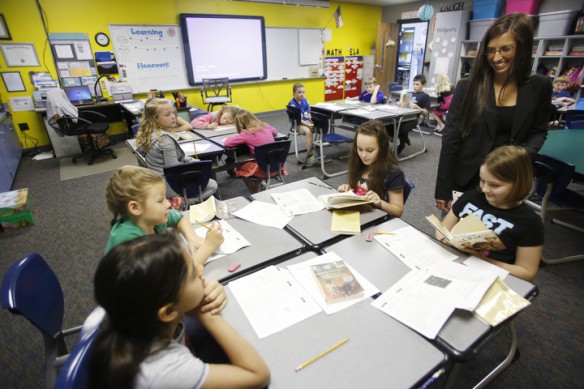
Bridgette Passafiume reviews “Because of Winn-Dixie” by Kate DiCamillo with students in her 3rd-grade class at Central Elementary School (Marshall County).
Photo by Amy Wallot, April 21, 2015
By Brenna R. Kelly
brenna.kelly@education.ky.gov
When a 5th-grade student at Central Elementary went out of his way to help a younger student, his teacher didn’t just tell him thank you or give him a pat on the back – she made sure all 480 students at the school heard about his kindness.
“He received special recognition for going above and beyond,” said Bridget Powell, a 5th-grade English/language arts teacher. The principal praised the student during the announcements and at the Friday assembly he was recognized again.
“We do a lot of celebrating here. It’s part of our culture,” said Principal Shannon Solomon, who has been at the Marshall County school for eight years.
That positive atmosphere, teachers who work as a team, data-driven instruction and high expectations for students are all part of why the school was named a Blue Ribbon school by the U.S. Department of Education. Federal education officials declared the school an Exemplary High-Performing School, one of four schools in the state to receive the honor.
When the award was announced, students marched in a parade around the school wearing Blue Ribbon T-shirts and carrying blue balloons they later released into the sky.
“They felt a sense of school pride in celebrating their accomplishments,” Solomon said.
The local fire department and cheerleaders from Marshall County High School and many residents in Benton, a town of about 4,000 people, came to the school to join the celebration.
“We wanted the students to understand their accomplishment and what it meant for them and their school,” Solomon said.
She credits the Positive Behavioral Interventions and Supports program, which the school implemented five years ago, with turning the school’s culture into one of positive reinforcement and respect.
Students, such as the 5th-grade boy, get positive behavior referrals, then those names are drawn each week for even more recognition. Teachers are also recognized for positive actions and can win gift certificates or Coke breaks if their name is drawn.
“We have very few discipline problems,” Solomon said. “And office referrals are minimal which keeps kids in the classroom learning.”
That, in turn, has a positive effect on student learning, she said.
In the latest Unbridled Learning College and Career-Readiness for All accountability model, the school ranked in the 99th percentile of Kentucky elementary schools, earning it a Distinguished rating along with being named a School of Distinction for meeting its annual measurable objective.
The school has consistently performed well in state assessments, but for the staff it wasn’t good enough.
The staff felt that the school’s writing program should be stronger, so two years ago they implemented a new standards-driven writing plan.
“And now we celebrate writing,” Solomon said. “We try to put writing on the forefront of things and incorporate it in as many different ways as possible and then celebrate it.”
For example, the school created a Writing Stars board which features three students in each grade every month. The board shows the progression of writing from kindergarten to 5th grade. Each month’s winners get T-shirts, are recognized at an assembly, and have their pictures posted on the school’s Facebook page.
“They love to be able to get their writing on the board,” Powell said. “They feel like, ‘Hey, I’m important and I matter.’ It gives them a sense of personal and school pride.”
But more important it’s working. The school went from 41.3 percent of students rated as Proficient or Distinguished in writing during the 2012-13 school year to 60.5 percent of students at that level in 2013-14, according to state assessment data.
“I feel like the kids are getting better at expressing their ideas, not just in narrative writing, but also with informational text in science and social studies. Writing has become a way of life at Central Elementary,” Powell said.
Another change undertaken at the school was to replace traditional report cards in favor of standards-based grading. Central Elementary’s teachers developed the report cards and the school served as a pilot for the district.
Teachers don’t use grade books but each teachers uses his or her own method to track their students’ mastery of the standards.
“I try to give teachers as much autonomy as possible in everything that they do here,” Solomon said.
At first teachers graded on every single standard, but after parents said the amount of information was overwhelming, the report cards were revised to report mastery by sub-domains, she said.
Standards-based grading at Central was an easy shift, because as part of the PBIS program the school had already decided that academic grades would not be reflections of behavior, Solomon said.
“You could have a straight A student who is brilliant but fails a class with traditional grading because they didn’t do their homework and received zeros,” she said. “Standards-based grading allows for parents, students and teachers to know exactly the level of mastery of a specific standard.”
Instead students get conduct grades in areas like respect, responsibility. There is also an overall conduct grade.
In recent years, the school also has focused on Response to Intervention as a way to make sure all students are getting the help they need to succeed, Solomon said.
“We’ve really worked to close our achievement gap,” she said, referring to lower achievement among specific groups of students, such as minorities, students from low income families and those with disabilities.
At Central, about 53 percent of students qualify for free or reduced-priced lunch, she said. Assessment data from 2013-14 shows that there is now only small discrepancies between the math and reading scores of “all students” and students in the gap group.
In reading, 68.5 percent of students in the gap group achieved Proficient or Distinguished status, 73 percent of all students achieved that level. In mathematics, 65.7 percent of students in the gap group were Proficient or Distinguished while 72.6 percent of all students were at that level.
And those gaps have been reduced from the 2012-13 school year, data shows. In reading, the gap went from 6.7 points in 2012-13 to 4.5 points in 2013-14. In math, the gap went from 7.6 points in 2012-13 to 6.9 points in 2013-14.
In addition to RtI, the school has used Reading Recovery, mentors, differentiated instruction and technology have to narrow the achievement gap.
“We push all of our students,” Powell said. “We have very high expectations of our kids, we set the bar high and we realize that all kids are capable of high levels of learning. They work hard and we definitely reward them for their hard work.”
MORE INFO …
Shannon Solomon Shannon.Solomon@marshall.kyschools.us
Bridget Powell Bridget.Powell@marshall.kyschools.us




Leave A Comment